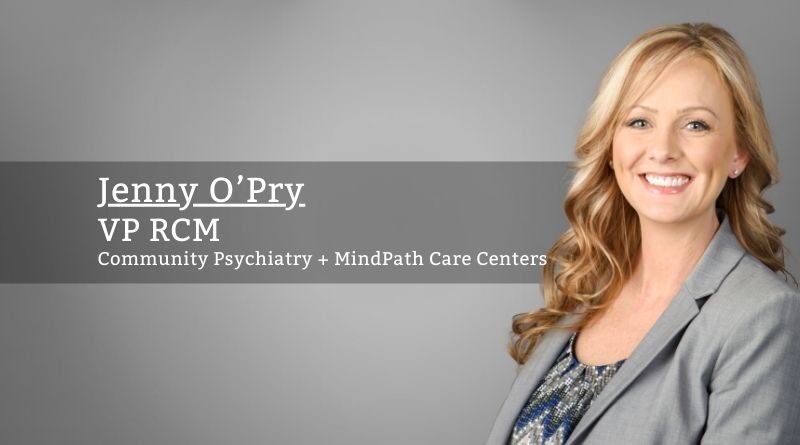Prioritizing Relationships in the Revenue Cycle Process
By Jenny O’Pry, VP RCM, Community Psychiatry + MindPath Care Centers
Why open communication is vital during a time of growth
The behavioral health specialty is a profession built on trust. After all, if a clinician doesn’t nurture a strong relationship with their patient, it can impair or hinder treatment. This principle trickles down to all areas of managing a behavioral health organization, especially its revenue cycle management process (RCM).
I was reminded of this recently when a patient called our patient advocacy representative line, upset about a bill she had received. It soon became clear that she was suicidal. The RCM manager calmly followed our crisis protocol, and the police and a clinician were quickly dispatched to provide care. Until they arrived, my manager stayed on the phone with the distraught woman, prioritizing her safety above all else. This is what it means to serve our patients.
It’s a pretty powerful example that explains why so much of what we do is relationship-driven. We are constantly striving to improve our connections, whether with patients, clinicians, or payers.
It’s an exciting time for Community Psychiatry. Earlier this year, we acquired MindPath Care Centers, increasing our presence from one state to four. Recently, we expanded into Texas, increasing our footprint to five states. With growth comes complexities. Now more than ever, it is important that our teams work together to support our clinicians and provide quality services to our patients.
One challenge is handling this increase in patient volume. There is currently a high demand for behavioral health clinicians, so we must be strategic on how many patients we support in a way that balances clinicians’ schedules.
RCM has historically been a very manual process that correlates to high administrative costs and a high error rate, which can cause patient dissatisfaction. Our job on the RCM team is to evaluate processes, streamline, document, and identify automated technology tools and solutions while ensuring we meet payer, state, and federal regulations.
The RCM process relies on the strength of its relationships with patients, clinicians, and payers. Each has its unique challenges and solutions.
We recognize that technology can provide valuable tools, but it’s only as good as the people behind it. Any improperly documented/designed, automated, or tested process will create significant output problems, causing potential revenue impacts and patient frustrations, basically a mess to clean up. For me, my team remains the most valuable tool because we create solutions together.
Many specialties were negatively impacted during the COVID-19 pandemic, but our clinicians didn’t skip a beat. We were able to transition our practices to telehealth, allowing us to continue treatment with patients. This also allowed us to reach even more patients who didn’t have easy access to care.
The RCM process relies on the strength of its relationships with patients, clinicians, and payers. Each has its unique challenges and solutions.
Patients
Open and consistent communication with our patients is key to strengthening our partnership with them. Healthcare’s revenue cycle is more complex than most patients might expect. Contracting, credentialing, location adds, procedure codes, modifiers, diagnosis codes, and patient benefits all have to align perfectly to receive the proper payment.
Any new technology we add in an attempt to automate this process must be done thoughtfully and strategically. That’s why education and consistency are so important in building our relationship with patients.
We try to approach every patient call with a one-touch resolution, meaning our goal is to answer any questions they may have while on the phone. We spend hours training team members to explain invoices to patients and engage their help in getting a claim paid.
We are contractually obligated by the payers to bill patients for the balance they owe according to their benefits and policy with the payer. While it is not an easy conversation, our team wants to educate patients and answer any questions that arise regarding their responsibility.
Clinicians
I love working with the clinicians at Community Psychiatry + MindPath because they are among the most compassionate, curious, and empathetic doctors with whom I’ve ever worked. They truly want to understand the whys and are always eager to be a part of the solution.
Building trust with clinicians—and not overstepping—is a delicate scenario in the RCM process. Sometimes we have to notify clinicians when their patients are falling behind on paying bills. Simply put, we need their help to get paid. Luckily, clinicians support the idea that being financially responsible is a major part of the healing process for many patients. This allows them to tactfully include the conversation in treatment.
But it still doesn’t make the clinicians feel any less awkward, and we involve them only when absolutely necessary. They are in the business of helping people, not necessarily collecting money.
Payors
We are constantly striving to build strong relationships with insurance companies. We have found these to assist us in resolving issues with contracting, credentialing, and reimbursement-related issues. This helps reduce patient frustrations and ensure clinicians are reimbursed for the services they render.
We’ve worked hard and continue to prove our value to the payors. As a result, payors are seeing the quality of care we are providing. It takes time to build this relationship and balance the needs of both payors and patients.
The healthcare revenue cycle is, indeed, a complex industry. But by building strong relationships, we can tackle issues as they arise and create a positive experience for our patients.



